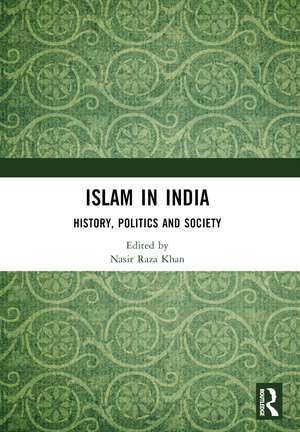Islam in India: History, Politics and Society
Editat de Nasir Raza Khanen Limba Engleză Paperback – 28 noi 2024
Besides being a major religious doctrine, Islam has been the main political ideology for many dynasties in India such as Delhi Sultanate (1206-1451); the Illbaris Turks (also known as Mamluk 1206–90); Khiljis (1290–1320); Tughlaqs (1320–1414); Sayyids (1414–51), Afghans and the Mughal Empire. Islam played a pivotal role in shaping the polity and society during the period of each dynasty. This book argues that Islam in India ought to be seen not only as a political and religious ideology of the dynasties, but also as a significant force that shaped the cultural fabric of the country.
Print edition not for sale in South Asia (India, Sri Lanka, Nepal, Bangladesh, Pakistan and Bhutan)
| Toate formatele și edițiile | Preț | Express |
|---|---|---|
| Paperback (1) | 312.54 lei 22-36 zile | +26.78 lei 6-12 zile |
| Manakin Press – 28 noi 2024 | 312.54 lei 22-36 zile | +26.78 lei 6-12 zile |
| Hardback (1) | 1008.35 lei 43-57 zile | |
| Manakin Press – 9 iun 2023 | 1008.35 lei 43-57 zile |
Preț: 312.54 lei
Nou
Puncte Express: 469
Preț estimativ în valută:
59.81€ • 62.21$ • 49.38£
59.81€ • 62.21$ • 49.38£
Carte disponibilă
Livrare economică 24 martie-07 aprilie
Livrare express 08-14 martie pentru 36.77 lei
Preluare comenzi: 021 569.72.76
Specificații
ISBN-13: 9781032508924
ISBN-10: 1032508922
Pagini: 304
Dimensiuni: 174 x 246 x 21 mm
Greutate: 0.56 kg
Ediția:1
Editura: Manakin Press
Colecția Routledge
ISBN-10: 1032508922
Pagini: 304
Dimensiuni: 174 x 246 x 21 mm
Greutate: 0.56 kg
Ediția:1
Editura: Manakin Press
Colecția Routledge
Public țintă
Academic, General, Postgraduate, and Undergraduate AdvancedCuprins
Introduction
Nasir Raza Khan
Syncretic Traditions: Sufism and Bhakti in Indian History
1. Piety, Impiety and Islam: Muslim Religious Practice in Eighteenth Century Shahjahanabad
Rohma Javed Rashid
2. The Khwaja’s Creed: Gharib Nawaz and Propagation of Sufi Thought
Babli Parveen
3. Sufi and Bhakti Tradition: Corresponding and Divergent Trends
Akhlaque Ahmad Ahan
4. Pluralism in Medieval Islamic Heritage: A Study of Sufi Ethos of Kashmir
G. N. Khaki
5. Sufi Contributions to the Intellectual Culture of Islam in India: Awarif-al-Ma’arif and Early Sufi Writings
Mohammad Shaheer Siddiqui
Islam and the State: History, Religion and Identity
6. Mughal Identity: Central Asian or Indian
Tasneem Suhrawardy
7. Cultural, Literary and Artistic world of Indo-Central Asia
Gulfishan Khan
8. Looking Through European Eyes: Mughal State and Religious Freedom as Gleaned from the European Travellers’ Accounts of the Seventeenth Century
Nishat Manzar
9. Contesting The Authority of The Mughal Emperor: Abdul Qadir Badauni’s Attitude Towards Kingship
Ikramul Haque
10. Masjids, 'Community Life' and Resistance in Colonial India: A Case Study of Masjid-e Jahan Numa at Shahjahanabad up to A.D 1870s.
Sadia Aziz
Intellectual Movements and Contemporary Perspectives: Islam in the Modern Age
11. Drawing Parallel with 19th Century Muslim Movements in India with Reform Movements Across Muslim Weltanschauung: An Analysis of Syed Ahmad’s Work
M. Waseem Raja
12. Maktubat-e Syed Ahmad Khan and His Agenda of Social and Educational Reform
Parwez Nazir
13. Sir Syed’s Aligarh Movement and Muslim Women Discourses
Naiyer Azam
14. Shi’i in India: A Minority within the Minority
Sayyad Mohd. Afzal
15. Pan-Islamism and Khilafat Movement: Understanding Muslim Minds in Colonial Perspectives
Hassan Imam
16. Contemporary Islam: A Realistic Assessment of the Current Dynamics and Progressive Strategies for the Future
Sultan Shahin
Bibliography
Index
Nasir Raza Khan
Syncretic Traditions: Sufism and Bhakti in Indian History
1. Piety, Impiety and Islam: Muslim Religious Practice in Eighteenth Century Shahjahanabad
Rohma Javed Rashid
2. The Khwaja’s Creed: Gharib Nawaz and Propagation of Sufi Thought
Babli Parveen
3. Sufi and Bhakti Tradition: Corresponding and Divergent Trends
Akhlaque Ahmad Ahan
4. Pluralism in Medieval Islamic Heritage: A Study of Sufi Ethos of Kashmir
G. N. Khaki
5. Sufi Contributions to the Intellectual Culture of Islam in India: Awarif-al-Ma’arif and Early Sufi Writings
Mohammad Shaheer Siddiqui
Islam and the State: History, Religion and Identity
6. Mughal Identity: Central Asian or Indian
Tasneem Suhrawardy
7. Cultural, Literary and Artistic world of Indo-Central Asia
Gulfishan Khan
8. Looking Through European Eyes: Mughal State and Religious Freedom as Gleaned from the European Travellers’ Accounts of the Seventeenth Century
Nishat Manzar
9. Contesting The Authority of The Mughal Emperor: Abdul Qadir Badauni’s Attitude Towards Kingship
Ikramul Haque
10. Masjids, 'Community Life' and Resistance in Colonial India: A Case Study of Masjid-e Jahan Numa at Shahjahanabad up to A.D 1870s.
Sadia Aziz
Intellectual Movements and Contemporary Perspectives: Islam in the Modern Age
11. Drawing Parallel with 19th Century Muslim Movements in India with Reform Movements Across Muslim Weltanschauung: An Analysis of Syed Ahmad’s Work
M. Waseem Raja
12. Maktubat-e Syed Ahmad Khan and His Agenda of Social and Educational Reform
Parwez Nazir
13. Sir Syed’s Aligarh Movement and Muslim Women Discourses
Naiyer Azam
14. Shi’i in India: A Minority within the Minority
Sayyad Mohd. Afzal
15. Pan-Islamism and Khilafat Movement: Understanding Muslim Minds in Colonial Perspectives
Hassan Imam
16. Contemporary Islam: A Realistic Assessment of the Current Dynamics and Progressive Strategies for the Future
Sultan Shahin
Bibliography
Index
Notă biografică
Nasir Raza Khan (Ph.D.) is Hony. Director of India Arab Cultural Centre, Jamia Millia Islamia, New Delhi, India. He is former visiting professor of ICCR Chair of International Studies, Lebanese American University, Beirut, Lebanon, and former director of the Lal Bahadur Shastri Centre for Indian Culture, Embassy of India, Tashkent, Uzbekistan.
Descriere
Islam in India: History, Politics and Society is based on the historical and contemporary relevance of the religion and its related culture(s) in India.
